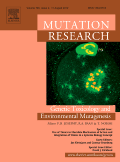
MUTATION RESEARCH-GENETIC TOXICOLOGY AND ENVIRONMENTAL MUTAGENESIS
metrics 2024
Illuminating the impact of environmental factors on genetic integrity.
Introduction
MUTATION RESEARCH-GENETIC TOXICOLOGY AND ENVIRONMENTAL MUTAGENESIS, published by Elsevier, is a renowned journal that explores critical advancements in the field of genetic toxicology and environmental mutagenesis. With an ISSN of 1383-5718 and an E-ISSN of 1879-3592, it ranks in Q3 for Genetics and Q2 for Health, Toxicology, and Mutagenesis as of 2023. This journal not only emphasizes the importance of environmental factors in genetic material alterations but also disseminates significant research findings that aid in understanding the implications for public health and safety. Operating from Amsterdam, Netherlands, it serves as a pivotal platform for researchers, professionals, and students, fostering an informed community keen on evolving the parameters of genetic research. Although it currently does not offer open access, the journal's commitment to high-quality peer-reviewed content ensures substantial contributions to the academic literature, enhancing our comprehension of mutagenic processes and their environmental triggers.
Metrics 2024
 0.57
0.57 2.30
2.30 2.50
2.50 126
126Metrics History
Rank 2024
Scopus
IF (Web Of Science)
JCI (Web Of Science)
Quartile History
Similar Journals
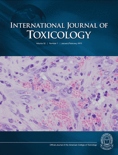
INTERNATIONAL JOURNAL OF TOXICOLOGY
Exploring the Complexities of Toxic Exposure and Safety.The International Journal of Toxicology, published by SAGE Publications Inc, serves as a cornerstone of scholarly research in the field of toxicology, with an established history dating back to 1982. This esteemed journal, ISSN 1091-5818 and E-ISSN 1092-874X, functions within the Q3 quartile in Toxicology, ranking 94 out of 133 in the Pharmacology, Toxicology and Pharmaceutics category per Scopus metrics, reflecting its commitment to advancing scientific understanding in this critical area. The journal not only aims to disseminate high-quality research but also encourages open access to vital studies, thus fostering collaboration and innovation among researchers, professionals, and students alike. With a focus on various aspects of toxicology, including but not limited to environmental, clinical, and molecular toxicology, the International Journal of Toxicology is dedicated to bridging gaps in toxicity research and promoting safe practices across numerous disciplines. As it converges towards 2024, the journal continues to play a vital role in shaping the discourse surrounding the implications of exposure to toxic substances in human health and the environment.
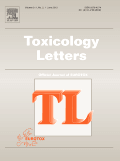
TOXICOLOGY LETTERS
Advancing toxicological insights for a safer tomorrow.TOXICOLOGY LETTERS is a prominent journal dedicated to advancing the field of toxicology, providing a platform for high-quality research and reviews that explore the effects of chemical substances on biological systems. Published by Elsevier Ireland Ltd, this peer-reviewed journal has established itself as a vital resource in toxicological research since its inception in 1977, with a convergence of studies extending to 2024. With an impressive Scopus ranking, positioned at #28 out of 133 in the Toxicology category, TOXICOLOGY LETTERS garners a respectable percentile of 79, highlighting its significance in the academic community. Although it is not an open-access journal, its research is accessible through institutional subscriptions, ensuring that critical insights into human health and environmental safety are disseminated effectively. Being categorized in the Q2 quartile in both Medicine (miscellaneous) and Toxicology for 2023 further emphasizes its relevance and impact in these fields. This journal aims to foster collaboration between researchers and professionals, encouraging the exploration of innovative solutions to chemical hazards and the promotion of safer practices in pharmacology and toxicology.

Toxicology Research
Exploring the intersection of health and environment.Toxicology Research is a distinguished journal dedicated to advancing the field of toxicology through the dissemination of high-quality research. Published by Oxford University Press, this UK-based journal focuses on critical aspects of toxicology and mutagenesis, highlighting both environmental and pharmacological implications. With an ISSN of 2045-452X and an E-ISSN of 2045-4538, it serves as a valuable resource for researchers, professionals, and students alike. Currently categorized in the Q3 quartile for Health, Toxicology and Mutagenesis, as well as Toxicology in 2023, Toxicology Research maintains a visible presence in Scopus rankings, positioning itself within the targeted professional community. Although the journal operates without open access options, its importance in contributing to scientific discussions and policy formation is undeniable. Covering content from 2012 to 2024, it continues to provide insights into contemporary toxicological challenges, thereby fostering interdisciplinary collaborations and informing best practices in health and safety.

Environnement Risques & Sante
Unveiling Insights on Environmental Risks and Public HealthEnvironnement Risques & Sante is a prominent journal focused on the intersection of environmental issues, public health, and safety, offering a platform for scholarly discourse on the critical challenges posed by environmental risks to human health. Published by JOHN LIBBEY EUROTEXT LTD, this journal aims to disseminate impactful research that enhances our understanding of toxicology, mutagenesis, and their implications for public health policy and practices. Though it ceased coverage in Scopus in 2021, its historical contributions remain relevant, addressing urgent topics in environmental science and occupational health. Researchers and professionals engaged in these fields will find valuable insights and findings that inform practice and promote sustainable solutions. For interested readers, further exploration of the journal can provide essential knowledge in coping with contemporary environmental health challenges.
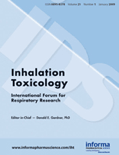
INHALATION TOXICOLOGY
Pioneering Insights into Airborne Exposures.Inhalation Toxicology, published by Taylor & Francis Ltd, is a premier journal dedicated to advancing the field of toxicology with a particular focus on inhalation exposure and its impact on human health. Established in 1989, this journal provides a vital platform for original research, reviews, and case studies that explore the toxicological effects of inhaled substances, making it essential reading for researchers, health professionals, and regulatory scientists. With an Impact Factor that situates it in the Q3 category in both Health, Toxicology and Mutagenesis, the journal asserts its relevance within the scientific community, particularly emphasizing its contributions as indexed by Scopus rankings in related fields. Although it follows a traditional access model, the journal's commitment to delivering high-quality research continues to foster significant discussions and advancements in understanding inhalation toxicology. For those at the forefront of environmental science and pharmacology, Inhalation Toxicology is an indispensable resource for both current research and future innovations in the discipline.
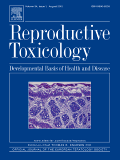
REPRODUCTIVE TOXICOLOGY
Exploring the intricate links between toxins and reproductive health.REPRODUCTIVE TOXICOLOGY, published by Pergamon-Elsevier Science Ltd, stands as a pivotal journal in the field of toxicology, specifically focusing on the effects of environmental and pharmaceutical agents on reproductive health. Established in 1987, the journal has a rich history of contributing to the scientific community, and it continues to publish rigorous research and reviews that illuminate the intricate relationships between various toxicants and their reproductive impacts. With an impressive 2023 Q2 ranking in Toxicology and a Scopus ranking of #42 out of 133 in the Toxicology category, REPRODUCTIVE TOXICOLOGY emphasizes high-quality scholarly work that influences both academia and industry practices. Researchers, professionals, and students in toxicology, pharmacology, and public health will find this journal an invaluable resource for staying informed on the latest findings and methodologies in reproductive toxicology. While the journal currently adheres to traditional publishing models without open access options, its authoritative content remains accessible to a global audience interested in advancing the understanding of toxicological impacts on reproduction.
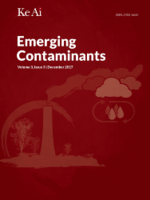
Emerging Contaminants
Leading the charge in contaminant research and remediation.Emerging Contaminants is a leading international journal dedicated to the exploration and analysis of novel pollutants, their effects, and the methodologies for their detection and remediation. Published by KEAI PUBLISHING LTD in China, this Open Access journal has been at the forefront of scientific discourse since its inception in 2015, allowing unrestricted access to cutting-edge research. With an impressive categorization in the top Q1 quartile across diverse fields, including Health, Toxicology and Mutagenesis, and Public Health, it ranks remarkably high—41st out of 665 in Public Health and 10th out of 133 in Toxicology according to Scopus metrics, demonstrating its vital role in advancing our understanding of environmental health risks. By bridging the gap between academia and practical applications, Emerging Contaminants not only enriches the scientific community but also serves as an essential resource for policymakers and industry leaders seeking effective solutions to environmental challenges. Researchers, professionals, and students alike are encouraged to engage with the journal’s comprehensive studies and findings, contributing to a sustainable future.

MUTATION RESEARCH-FUNDAMENTAL AND MOLECULAR MECHANISMS OF MUTAGENESIS
Exploring the Frontiers of Genetic MutationMUTATION RESEARCH - FUNDAMENTAL AND MOLECULAR MECHANISMS OF MUTAGENESIS is a premier peer-reviewed journal published by Elsevier, dedicated to advancing the understanding of mutagenesis and its broader implications in genetics, health, and molecular biology. With an impressive converged publication history from 1964 to 2024, this journal provides a vital platform for the dissemination of high-quality research findings, contributing significantly to the field's knowledge base. Indexed in Scopus, it holds a Category Quartile ranking of Q3 in Genetics and Q2 in Health, Toxicology, and Mutagenesis, further underscoring its relevance and stature. Access options are available, catering to a diverse audience of researchers, professionals, and students eager to stay informed on the latest developments in mutagenesis research. By bridging experimental studies and theoretical frameworks, the journal plays a crucial role in exploring the fundamental mechanisms underlying genetic mutations and their effects on human health and the environment.

TOXICOLOGY
Advancing toxicological insights for a safer tomorrow.TOXICOLOGY, published by Elsevier Ireland Ltd, is a prestigious peer-reviewed journal specializing in the field of toxicology. With an ISSN of 0300-483X and an E-ISSN of 1879-3185, this journal provides a vital platform for researchers, professionals, and students to disseminate and access groundbreaking studies from 1973 to present, with a convergence set until 2024. Recognized for its high impact, it holds a Q1 ranking in Toxicology category and ranks #18 out of 133 in Scopus's sector of Pharmacology, Toxicology, and Pharmaceutics, placing it in the 86th percentile. While the journal is not open access, it nonetheless offers a rich collection of research articles that enhance the understanding of toxicological science and its applications. The journal's objectives encompass advancing knowledge in the toxicological evaluation of substances, promoting safety in public health, and fostering dialogue among scholars. As a key resource in the field, TOXICOLOGY plays a crucial role in advancing research and informing practices related to toxicological risks and safety assessments.
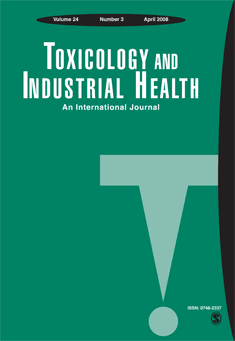
TOXICOLOGY AND INDUSTRIAL HEALTH
Advancing knowledge in toxicology for a safer industrial future.TOXICOLOGY AND INDUSTRIAL HEALTH, published by SAGE PUBLICATIONS INC, is a premier journal in the field of toxicology, public health, and environmental health, with a significant history dating back to 1985. With its ISSN 0748-2337 and E-ISSN 1477-0393, the journal provides a platform for disseminating groundbreaking research and comprehensive reviews that address the complexities of toxic substances in industrial and occupational settings. Despite its Q3 ranking among peers in health, toxicology, and public health, this journal is becoming increasingly influential, reflected in its growing citation metrics. Researchers and professionals benefit from its commitment to fostering knowledge in both theoretical and practical contexts, making it an essential resource for those dedicated to advancing understanding in this vital field. The journal's main objectives include promoting research addressing the implications of toxicology on health and safety standards across industries, ensuring accessibility to current studies for a global audience. Overall, TOXICOLOGY AND INDUSTRIAL HEALTH plays a critical role in bridging the gap between research and real-world applications, proving invaluable to students, professionals, and researchers alike in their pursuit of enhancing public health and environmental safety.